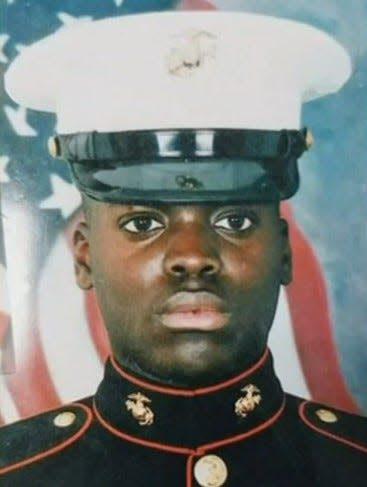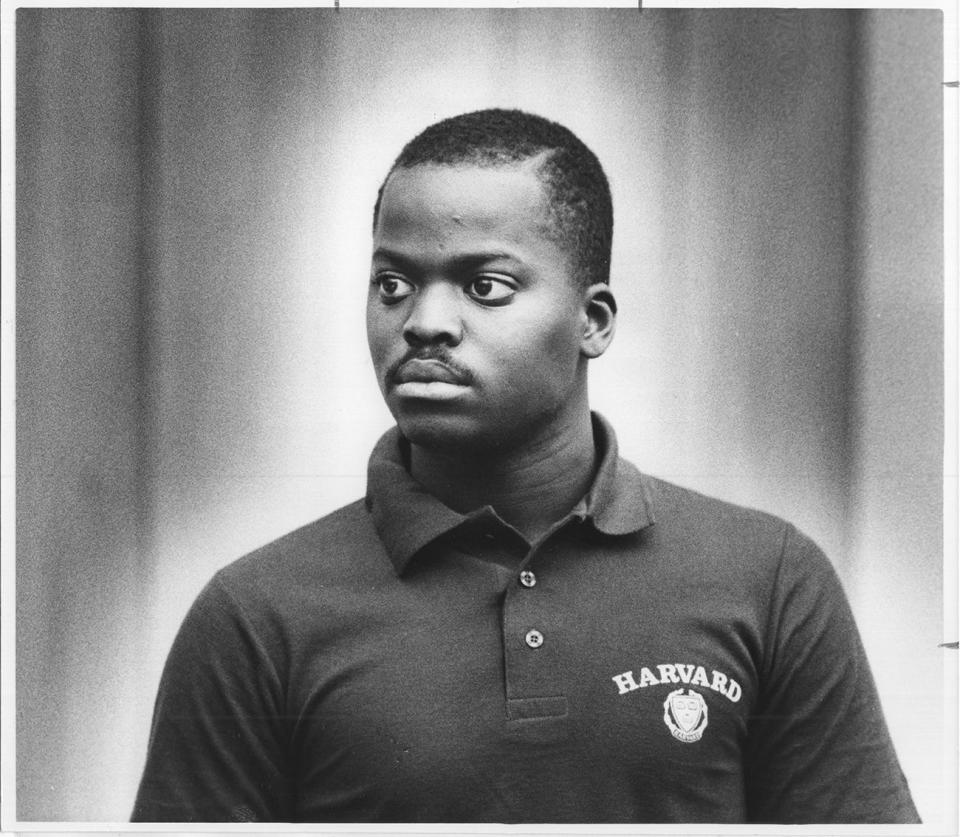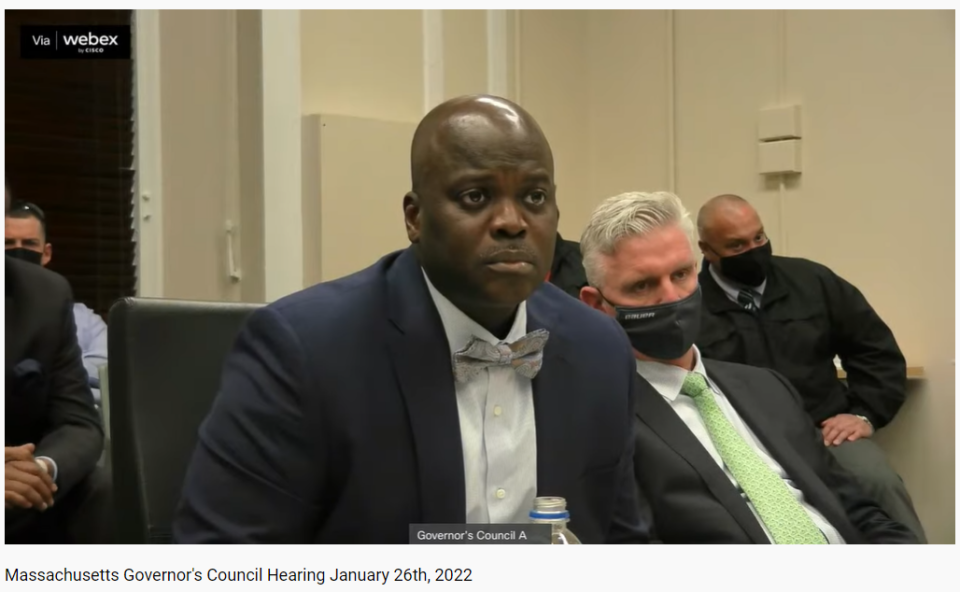Brockton killer faces withering questions, inspires impassioned, surprising support
- Oops!Something went wrong.Please try again later.
BOSTON — Thomas E. Koonce shot Mark J. Santos in the heart in 1987.
On Wednesday, supporters of Koonce told the Governor's Council that the Brockton man has earned his freedom with exemplary behavior during three decades behind bars. But the former Marine also faced withering questions from the officials who hold his future in their hands.
Pastor Donald Horsman was Koonce's chaplain for almost eight years at MCI-Norfolk. He told councilors that while Koonce needed to be locked up, he has used his prison time well.
"I believe he's going to spend the rest of his life leading others on a process of change, a process of transformation, a process of healing," Horsman said via videoconference. "That's why I recommend him. I really believe he's ready."
Koonce has the support of Gov. Charlie Baker, who this month commuted his conviction over the objections of Santos' family. With time served, that would make Koonce eligible for parole. But Koonce must also win the approval of the Governor's Council, an elected relic of the colonial era that confirms certain gubernatorial decisions.
The hearing lasted nine hours. Every speaker argued in favor of Koonce, including his son, Thomas Andrews, and former fellow inmates Conan Harris and Nickolas DeJarnette. Even Bristol County District Attorney Thomas Quinn III, whose office prosecuted Koonce before Quinn's election, spoke in favor of him.
Harris was imprisoned with Koonce at MCI-Norfolk for nine years. Now married to U.S. Rep. Ayanna Pressley (D-7th), Harris credited Koonce as a key figure in developing a restorative justice program at the prison.
"The one word that comes to mind: Consistent," said Harris. "By his example he showed leadership."
Several witnesses cited with amazement that Koonce was written up by guards exactly twice in his nearly 30 years inside. A prisoner can get disciplinary reports for infractions as minor as not making your bed properly or taking two milks instead of one at lunch, Harris said.
DeJarnette, who said he now runs three small businesses, appeared via video conference. He praised Koonce for encouraging him to get an education in prison.
"I love this man so much, I don't even call him a friend, I call him my brother," DeJarnette said. "I don't know where my life would be if I didn't cross paths with Thomas Koonce, but I know I am the evidence of who he is today."
'Unbearable grief'
No one spoke in opposition to Koonce's reduction in sentence. But Christopher Iannella, chairman of the Governor's Council, read into the record an October 2020 letter to the governor from the parents of Santos, the 24-year-old New Bedford man Koonce killed.
"In the years that have passed," the letter read, "we have experienced unbearable grief, pain, anger and suffering. The heartache never ends and when we seem to be making strides, Koonce brings us back to July 21, 1987."
The parents' letter goes on to say that Mark Santos had graduated from New Bedford High School with aspirations of becoming a police officer. Just before Koonce killed him, Santos had learned he had passed the police exam.
"He would have been a valued asset to the New Bedford community, which he loved dearly and wanted to serve and protect," the letter read.
Koonce, dressed in a navy suit and silver bow-tie, addressed the family in his remarks to the Governor's Council.
"I would again like to apologize to the Santos family for taking Mr. Mark Santos," said Koonce, who donned glasses to read his statement. "I know that their lives will never be the same … I am very sorry that you had to endure this painstaking process again. I can only hope and pray that one day in the future you will find it in your hearts to forgive me for taking your loved one's life. I am truly sorry."
'I still don't buy your story'
Some councilors pressed Koonce with hard questions, including Councilor Robert L. Jubinville. The Milton Democrat probed aspects of the July 20, 1987, shooting like how Koonce got the .22 pistol that fired the fatal shot (he bought it in Washington State and flew to Boston with it) and whether he really filed for a gun permit with Brockton Police.
"You're not under oath, so we can't charge you with perjury, but we can do a lot worse," said Jubinville, an allusion to Koonce spending the rest of his life behind bars if the Governor's Council votes against his commutation.
Still dissatisfied with Koonce's answers, Jubinville issued a warning.
"Whatever happened then, there's no reason to hide anything at this point," said the attorney and former State Police detective. "It doesn't matter. If you hold back something, we're going to think you're holding back a lot of things."
Councilors have three weeks to weigh the evidence before a planned Feb. 16 vote. Koonce will need at least four votes from the eight district-based members, assuming Lt. Gov. Karyn Polito, who serves as a ninth member, will vote for commutation.
Koonce has reason for hope, despite the grilling he endured from some councilors. Terrence Kennedy, a Lynnfield Democrat, had visited with Koonce in prison.
"I told you I didn't buy your story. And I still don't buy your story," Kennedy said toward the end of Wednesday's hearing. "I don't think it matters. I think it's more important what you've done (since the shooting). I don’t think that's why you're here. I think we're here to decide if you've earned a commutation. And I think you have."
The shooting
Before the fatal shooting, Koonce, then 20, had flown home on two weeks' leave from the Marines.
According to court documents, on July 20, 1987, Koonce, along with James Reace and two other men, were riding in Reace’s car and ended up at a nightclub in Westport (the former Alhambras) around 11 p.m. A fight broke out in the club between two groups from New Bedford and Brockton. The four men left the club and went to a Burger King in New Bedford where another group of men from New Bedford showed up with weapons.

Police arrived and dispersed the two groups before any violence erupted.
Koonce told the court that he and the other three men went to the United Front housing complex for a party.
That’s where Koonce and his friends got caught in the middle of another confrontation between the New Bedford and Brockton groups. Koonce said he pulled out his gun, a .22-caliber pistol, and fired a shot in the air out of the car window.
In testimony more than a year ago, Koonce told the Advisory and Parole Board that at the time he fired the gun, he did not realize that he had shot someone, although an individual sitting in the back seat of the car told Koonce, “I think you just shot someone.”
Koonce described the incident that way on Wednesday as well. Jubinville confronted Koonce with trial testimony contradicting that version.
"Did you say, "'(Expletive), I think I hit him?'"
"No, absolutely not," Koonce said.
Jubinville also bore down on whether Koonce shot in the air. Koonce said he isn't sure how his bullet hit Santos.
"I didn't aim at anybody," Koonce said Wednesday. "From however the car moved, from however we sped off that curb, because we were on a curb, a bullet found its way into Mark Santos' heart."

Jubinville, in a later exchange, cited the path the bullet took through the body of Santos to argue the trajectory had to be flat.
"I'll tell you what you did," the councilor said. "You pointed your gun in the direction of the crowd and you pulled the trigger."
Santos later died at St. Luke's Hospital, according to a New Bedford Standard-Times story in 1987.
Koonce told the Advisory and Parole Board that when Reace was arrested, he told police he was the one who fired a shot and did not want Reace to pay for his mistake.
Reace pleaded guilty to “accessory after the fact to first degree murder” and was sentenced on June 26, 1992, to five-to-seven years in state prison, suspended with three years probation.
'I think this was overcharged'
Several Governor's Councilors said Koonce should never have been charged with first-degree murder. They cited as evidence that prosecutors offered Koonce a plea deal in which he'd serve five-to-eight years for manslaughter. Koonce rejected that offer.
"Thirty years ago, I think this was overcharged," said Councilor Paul DePalo of Boston. "I think he would have been advised to take the plea."
DePalo went on to say that Koonce's case should be seen in the wider racial context of who gets locked up and for how long.
"We have evidence that the initial charging phase is one of the roots of the very significant disparities we see in sentencing along racial lines in Massachusetts," DePalo said.
Kennedy made a similar argument later in the hearing, noting that the Supreme Judicial Court now requires that jurors be instructed on "implicit bias."
"We know that African Americans are disproportionally sent to jail and disproportionally sent to jail for longer sentences," the District 6 councilor said. "There've been studies on it."
Quinn, Bristol County's top prosecutor, took exception to the idea that previous prosecutors overreached.
"The case was not overcharged," said Quinn, though he allowed that, "It's certainly not the strongest first-degree murder charge."
Quinn testified Wednesday that Taunton's John Moses, who prosecuted Koonce, argued in favor of Koonce's original 2010 petition for commutation. That petition failed.
"(Moses) said that he was troubled by the first-degree conviction," Quinn said. "In his closing argument in 1992 he only argued that the jury should convict Mr. Koonce of second-degree murder. He expressed concern over the first-degree conviction based on the facts and circumstances of the case. Mr. Moses was both a public defender and a prosecutor during his career and a respected attorney."

Quinn said Koonce today understands the gravity of his actions more clearly than when he sought a commutation in 2010.
"Commuting his sentence does not minimize his actions, but acknowledges the extraordinary efforts he made to reform his life," said Quinn. "For him to serve the rest of his life in prison without any opportunity for parole would not be fair or just under all of the circumstances of this case."
Iannella said Quinn showed fortitude in taking an unusual role for a prosecutor — arguing in favor of a reduced conviction that could set a killer free.
"It doesn't happen that a DA goes to a commutation to support commutation," the councilor from District 4 said to Quinn. "A very courageous act. You're a man of the highest integrity."
Should Koonce get the blessing of the Governor's Council when its members vote on Feb. 16, he will not be a free man. He would still have to apply for and be granted parole. Iannella said that process could take four or five months.
State House News Service and Linda Roy of the New Bedford Standard-Times contributed to this report. Send your news tips to reporter Chris Helms by email at CHelms@enterprisenews.com.
This article originally appeared on The Enterprise: Brockton Thomas Koonce: Governor's Council murder commutation hearing

